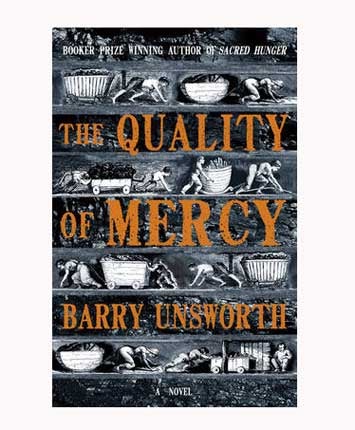The Quality of Mercy, By Barry Unsworth
The Sacred Hunger finally has a sequel, and in it the slave ship's crew are back in 18th-century Blighty awaiting trial for their crimes

What kind of historical novelist is Barry Unsworth?
Despite a practised ear for the idioms of the mid-18th-century drawing-room, and a weather eye for the contents of the mid-18th-century wardrobe, he is not a pasticheur. And although the consciousness that lies at the heart of this series of despatches from a 1760s courtroom is ultimately a contemporary one, neither is he the kind of postmodern trifler whose real aim is to remind his characters of the misfortune of having to inhabit a world before Freud. In fact, he is a historical novelist of a reliably old-fashioned sort: the writer who offers a plausible recreation of a bygone age and animates it with people whose motivations are consistent with the tenor of their time, while noting that the past is never neutral and that the behaviour of the men and women who wander about in it is there to be judged.
Unsworth's 16th novel, a rather tardy sequel to 1992's Sacred Hunger, has all these qualities in spades. Its Booker-winning predecessor tracked (at considerable length) the adventures of a slave ship's ground-down crew who mutinied off the American coast, made their way ashore into the Florida swamps and together with the surviving cargo established an egalitarian settlement built on the principle of inter-racial harmony. Now, 14 years later, after their apprehension by Erasmus Kemp, the son of the vessel's disgraced owner, and his posse of redcoats, the boys are back in Blighty awaiting trial, and a verdict Kemp hopes will appease a sensibility less interested in vindictive score-settling and more in a concept of justice that is almost abstract, the drawing of a line in "some cosmic ledger".
While Kemp's obsession is its driving force, the novel has several contending points of focus. Sullivan, the crew's Irish fiddler, has slipped out of Bridewell to make his way to the Tyneside colliery village inhabited by the family of his dead shipmate, Billy Blair. By chance, Kemp's gaze is travelling in the same direction, as he seeks to better exploit the local magnate Lord Stanton's coal stocks. Meanwhile, the celebrated abolitionist Frederick Ashton is immersing himself in the three court cases which have a bearing on the plot: a compensation suit involving the "jettisoning of cargo" (that is, the slaves thrown over the side prior to the mutiny); the trial of the mutineers; and a test case primed to establish the freedom of former slaves now domiciled in England.
Naturally enough, the procedural cards are stacked in favour of liberty and sweet reason, and yet beneath the surface lurk a fair amount of moral complexity and blurred lines. Kemp is in love with Ashton's sister. Ashton, cross-questioning the mutineers in their prison yard and hoping to enrol them on freedom's side in the matter of the drowned slaves, gets a dusty answer.
Kemp and Lord Stanton are neatly juxtaposed: the one a no-nonsense upwardly mobile bourgeois who lives by plan and design; the other a genteel dilettante whose "easy paternalism" provokes Kemp's hostility, "not because he felt any great sympathy for the mining folk, but because it brought his own early struggles back to mind. He had had to scrabble for money, fight for his place in the world."
Deftly arranged, faintly determinist (one just knows the grim destiny awaiting Borden, the veteran miner), and rarely over-advertising its research ("a dress of blue silk with hooped skirts cut to reveal the frill of petticoats and the white silk stockings and the pale blue satin slippers" etc), The Quality of Mercy falters only in its occasional staginess. Like Sacred Hunger, whose mutineers sometimes seemed to be discussing the evils of monetarism before the word was invented, it has a trick of couching its moral concerns in suspiciously modern-sounding language. When Miss Ashton, for example, remarks of her work among the fallen women that they should be granted "power over themselves", "self-respect" and "control over their own lives" she loses her historical tethering. The same is true of Mr Pike, Erasmus's lawyer, explaining that the best way to stop a revolution is to bamboozle the lower-middle-classes into aligning themselves with men of property.
Eventually, most of the moral and personal antagonisms on display lose their edge. Inches are given and received. Lord Stanton frustrates Kemp's commercial schemes through an act of generosity to one of his tenants. Kemp has the opportunity to send Sullivan to the gallows, but stays his hand. We know, of course – or think we know – what Unsworth wants us to feel about the world he has created, and the issues that run beneath it. At the same time, the fact that his characters never turn into moral ciphers is one of his greatest strengths.
Subscribe to Independent Premium to bookmark this article
Want to bookmark your favourite articles and stories to read or reference later? Start your Independent Premium subscription today.

Join our commenting forum
Join thought-provoking conversations, follow other Independent readers and see their replies